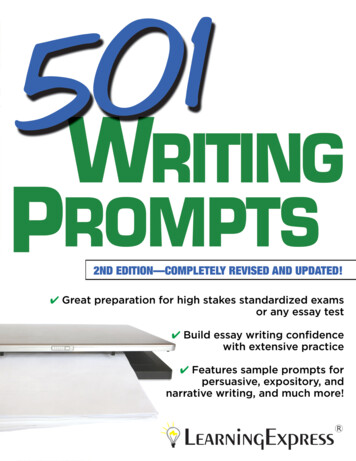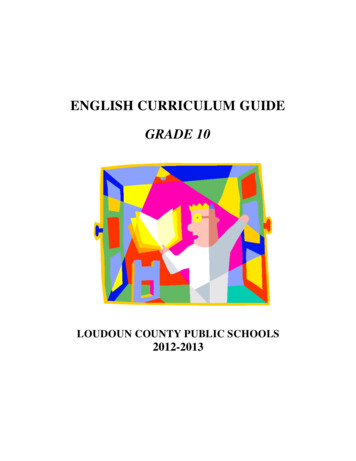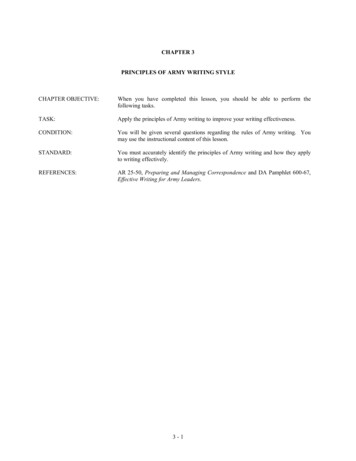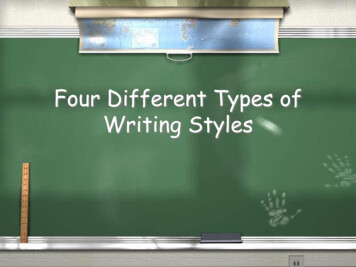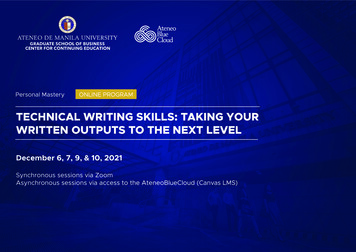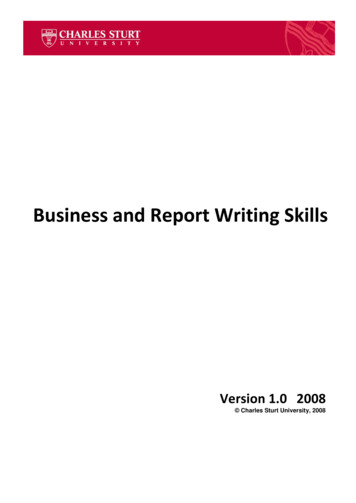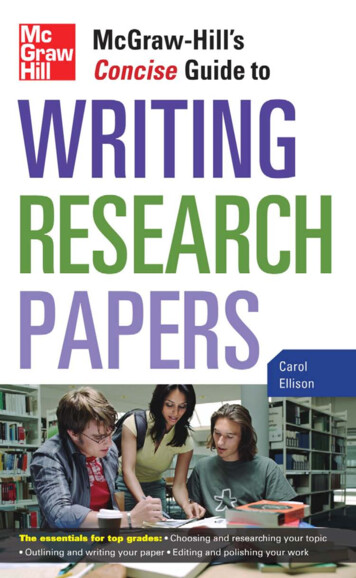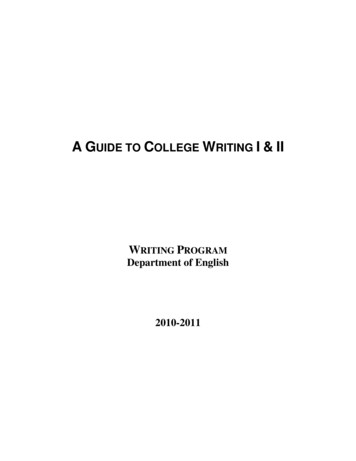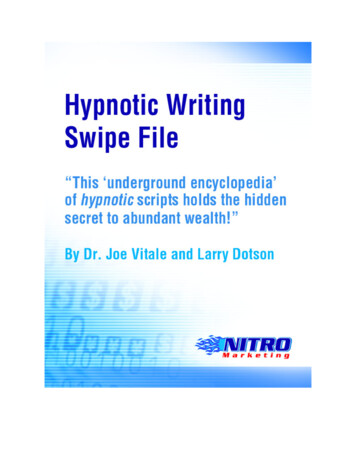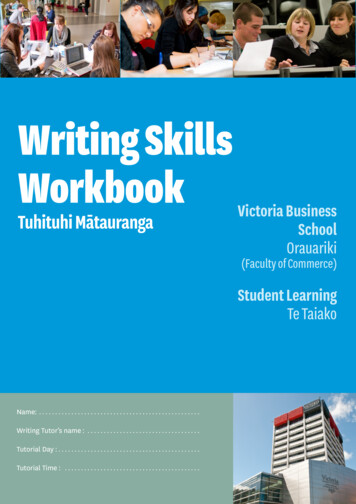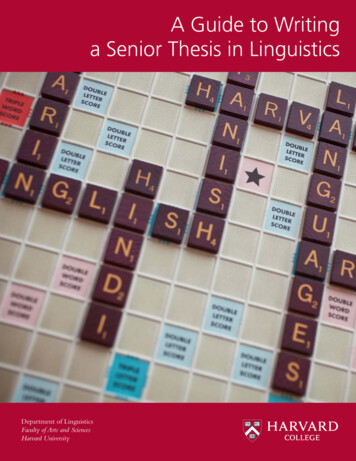
Transcription
A Guide to Writinga Senior Thesis in LinguisticsDepartment of LinguisticsFaculty of Arts and Sciencespage1 HarvardUniversity
Cover photo credit: Harvard Public Affairs and CommunicationsCopyright 2019, President and Fellows of Harvard College
A Guide to Writinga Senior Thesis in Linguisticsby Aurore Gonzalez, Yuyin He, and Julia Sturm
ContentsTime Management Tips. . . . . . . . . . . . . . . . . 1The Structure of the Thesis. . . . . . . . . . . . . 26Abstract. . . . . . . . . . . . . . . . . . . . . . . . . . . . . . . . . . . . . 26Sample Timeline . . . . . . . . . . . . . . . . . . . . . . 2Before the Project Begins. . . . . . . . . . . . . . . 3What is a linguistics senior thesis? . . . . . . . . . . . . . . . . . . . 3Why write a thesis?. . . . . . . . . . . . . . . . . . . . . . . . . . . . . . 3Writing and research opportunities whileyou’re a concentrator . . . . . . . . . . . . . . . . . . . . . . . . . . . . 4Planning the Project . . . . . . . . . . . . . . . . . . . 6How to choose a topic. . . . . . . . . . . . . . . . . . . . . . . . . . . 6Choosing an adviser. . . . . . . . . . . . . . . . . . . . . . . . . . . . . 8Choosing a methodology . . . . . . . . . . . . . . . . . . . . . . . . . 8Writing support. . . . . . . . . . . . . . . . . . . . . . . . . . . . . . . . 9Preparing to do a literature review. . . . . . . . . . . . . . . . . . 10Introduction. . . . . . . . . . . . . . . . . . . . . . . . . . . . . . . . . . 27Literature review. . . . . . . . . . . . . . . . . . . . . . . . . . . . . . .28Methodology. . . . . . . . . . . . . . . . . . . . . . . . . . . . . . . . . 29Results. . . . . . . . . . . . . . . . . . . . . . . . . . . . . . . . . . . . . . 29Discussion and analysis . . . . . . . . . . . . . . . . . . . . . . . . . . 29Conclusion. . . . . . . . . . . . . . . . . . . . . . . . . . . . . . . . . . . 29Finishing Up. . . . . . . . . . . . . . . . . . . . . . . . . 31Formatting basics. . . . . . . . . . . . . . . . . . . . . . . . . . . . . . 31Submitting your thesis. . . . . . . . . . . . . . . . . . . . . . . . . . . 35Readers. . . . . . . . . . . . . . . . . . . . . . . . . . . . . . . . . . . . . 35The thesis colloquium. . . . . . . . . . . . . . . . . . . . . . . . . . . 35Appendix. . . . . . . . . . . . . . . . . . . . . . . . . . . 36Glossing rules. . . . . . . . . . . . . . . . . . . . . . . . . . . . . . . . . 36Subfields. . . . . . . . . . . . . . . . . . . . . . . . . . . 11Phonology/phonetics. . . . . . . . . . . . . . . . . . . . . . . . . . . 11Morphology . . . . . . . . . . . . . . . . . . . . . . . . . . . . . . . . . 12Syntax . . . . . . . . . . . . . . . . . . . . . . . . . . . . . . . . . . . . . . 13Advising form . . . . . . . . . . . . . . . . . . . . . . . . . . . . . . . . 38IRB (Institutional Review Board). . . . . . . . . . . . . . . . . . 39Funding sources. . . . . . . . . . . . . . . . . . . . . . . . . . . . . . . 39Semantics. . . . . . . . . . . . . . . . . . . . . . . . . . . . . . . . . . . . 18End Matter. . . . . . . . . . . . . . . . . . . . . . . . . . 41Historical linguistics. . . . . . . . . . . . . . . . . . . . . . . . . . . . 20Abbreviations: . . . . . . . . . . . . . . . . . . . . . . . . . . . . . . . . 41Sociolinguistics. . . . . . . . . . . . . . . . . . . . . . . . . . . . . . . . 21Glossing abbreviations used in examples: . . . . . . . . . . . . . 41Psycholinguistics. . . . . . . . . . . . . . . . . . . . . . . . . . . . . . . 23Computational linguistics . . . . . . . . . . . . . . . . . . . . . . . . 24
Time Management TipsStart writing as soon as possible! Don’t put off writing your thesis until you knowexactly what your results are—if you do that, you won’t have enough time left to finishyour project. We recommend starting your abstract, introduction and literature reviewearly in the fall of your senior year, or even in the summer, which will be well before youhave your results. If you have your topic, that means you’re ready to get started.If you don’t know where to go next with your research, reach out to your adviser totalk about it! They’re here to help. Likewise, if you need help with formatting, outlining, organizing your writing, or any part of getting your ideas down on paper, reach outto the Departmental Writing Fellow! (You’ll find more information on the DWF andother sources of support in part 2 of this handbook.)Make sure to give your adviser enough time to give you feedback. Your adviser is abusy person, just like you are. If you’d like comments and suggestions on work you’vecompleted, don’t wait until the night before you need it to send it to your adviser. Goodpractice is to give your adviser at least a week, so that they can fit your work into theirschedule.Keep in mind that you’ll also be enrolled in other courses while you’re writing yourthesis. Set aside time to work on your thesis every week, just as you would set aside timefor any of your courses.If you are a joint concentrator, make sure you’re aware of, and keeping up with, all deadlines for your other concentration! Some concentrations, such as computer science, haveearlier deadlines than linguistics does.A Guide to Writing a Senior Thesis in Linguistics page 1
Sample TimelineJunior Year, Spring* Meet with Director of UndergraduateStudies (DUS) and Assistant Head Tutor(AHT) to discuss 98b optionsSpring registration deadline* Take 98b and investigate a research topic withan adviserSpring semesterDevelop a topic for your thesis and choose athesis adviserSummer/early fallSenior Year, Fall* Return signed advising form to DUSAdd/drop deadline* Begin taking 99aFall semester* Apply for IRB approval, if necessaryBeginning of fall semesterCollect dataSeptember-DecemberFinish first draft of Abstract, Intro, andLit ReviewSeptember–NovemberFinish first draft of MethodologyNovember–DecemberFinish first draft of Results & DiscussionDecember–JanuarySenior Year, Spring* Winter break ends, begin taking 99bJanuaryRevise first draftsJanuary–FebruaryWrite conclusionJanuary–FebruaryGive complete draft to adviser for final feedback Mid-FebruaryComplete final revisions* Submit thesis12 p.m., Friday before spring recess* Present at thesis colloquiumLate April* departmental requirement or deadlinepage 2 Sample TimelineMid-February to Mid-March
Before the Project BeginsWhat is a linguistics senior thesis?Senior linguistics concentrators are not required to write a thesis. However, a thesis isrequired for those who wish to graduate with honors in linguistics.Why write a thesis?The decision to write a thesis should be taken seriously. A thesis represents a large timecommitment and a significant intellectual undertaking. It’s especially important to stressthat writing a thesis is not in any sense an objectively ‘better’ option. Choosing to writea thesis simply means that you’ll be prioritizing an independent linguistics project during your senior year. Choosing not to write a thesis gives you more of an opportunity toprioritize something else that you care about, such as an extracurricular or new classesthat you’re taking.We’d encourage you to reconsider writing a thesis in linguistics if you feel that yourchoice is primarily motivated by external pressures. That is, if the only reason you wantto write a thesis is because someone else (such as parents, friends, etc.) thinks you should,now may be the time to rethink. Don’t choose a thesis because it seems like everyoneelse is doing it. Your experience writing a thesis will be your own, not theirs, and thisshould be a decision you make for yourself. Similarly, if the only reason you’re considering writing a thesis is to graduate with honors, you may also want to reconsider.The thesis requires deep and persistent engagement with a topic, and unless you have agenuine interest in that topic, the process will not be intrinsically rewarding.You shouldfeel positively drawn towards writing a thesis, rather than worried about the negativeconsequences if you don’t.section oneA linguistics thesis is an original research project undertaken during your senior yearat Harvard College. You will conduct research into past literature on your topic, conduct analysis of relevant data (including designing and running an experiment, whererelevant) and, eventually, produce a written final product of between 50–70 pages.Yourwork will fall under one of the linguistic subfields (phonetics/phonology, syntax, semantics, morphology, historical linguistics, sign linguistics, psycholinguistics, sociolinguistics,computational linguistics) you’ve studied during your time as a concentrator at thedepartment. During the course of your project, you’ll work closely with an adviser, afaculty member who will guide you through the process and help you refine your ideas.Your thesis will be an original piece of linguistic scholarship and will serve as a ‘capstone’of your time at Harvard.However, you might like to consider writing a thesis in linguistics if you feel yourselfdrawn to academia. If you are considering graduate school in linguistics or the socialsciences, the humanities, or even the sciences, a thesis can be an excellent educationalexperience for you. Writing a thesis is the closest you can come as an undergraduate tounderstanding what advanced graduate study will look like. It provides you with theopportunity to test and hone your skills as an independent researcher and, importantly,to make sure that you like the process of independent research. It’s a good way to gainsome self-knowledge. If you don’t like key aspects of writing your thesis (independentA Guide to Writing a Senior Thesis in Linguistics page 3
research, the writing process, intellectual debate and stimulation) you will likely notenjoy writing a master’s thesis or dissertation. Alternatively, many people who had notconsidered graduate school found the thesis writing process so appealing they changedtheir future plans.If you’re still unsure about whether or not to write a thesis and the deadline to make adecision about this is approaching, it can help to meet with the DUS or another facultymember to talk it through, and we encourage you to do so!Writing and research opportunities while you’re a concentratorAs a linguistics concentrator at Harvard, you will have many opportunities to undertake research in theoretical and experimental linguistics, or to conduct interdisciplinaryresearch involving linguistics. Among these opportunities are sophomore and juniortutorials (Ling 97r and Ling 98a), a research-oriented seminar (Ling 98b) and the seniorthesis writing workshops (Ling 99a and Ling 99b). The research skills you’ll learn inthese courses will be valuable to you while you work on your thesis, and, ideally, they’lleven spark the idea that becomes something you can spend your senior year exploring.Tutorials (Ling 97r and Ling 98a)Tutorials are seminars led by graduate students on linguistics topics that are not covered(or not covered in depth) in introductory linguistics courses. A tutorial consists of 6 sessions of two-hour long classes. Students will take two successive tutorials in one semester in order to fulfill the requirements of Ling 97r and Ling 98a. In the normal courseof events, you will take Ling 97r in the spring of your sophomore year and Ling 98a inthe fall of your junior year. To determine which tutorials you’ll take, you’ll rank all thetutorials offered by the department before the semester starts, and you’ll be assigned to atutorial based on your preferences and the enrollment level of each tutorial.The goal of tutorials is to help you read and understand a topic in depth, practice theskills needed in the field, and undertake your own research project. Though the assignments vary from tutorial to tutorial and depend on the instructor and the topic, tutorialsusually require students to write reading responses, complete exercises, and, very often,turn in a final research paper. We recommend that you write down the questions andsub-topics that interest you while taking tutorials, so that you can think about the possibilities of turning these questions into a research project. (In fact, we recommend doingthis during every linguistics class or lecture you attend—you never know when an ideawill occur to you!)The individual tutorial (Ling 98b)Ling 98b is intended exclusively for juniors concentrating in linguistics. It is a requirement for honors candidates (except for joint concentrators; if you have any questionsabout whether you are required to take this, consult with the DUS). Ling 98b is anindividual tutorial (directed reading/independent research) with an adviser, who maybe a professor, post-doctoral researcher, or graduate student of your choice (in agreement with the DUS and AHT). This adviser is typically someone affiliated with theDepartment of Linguistics at Harvard, but this isn’t strictly necessary: you can find youradviser in another department, or even in another university, if this is the best fit foryour research topic.page 4 Before the Project Begins
Once you’ve decided to enroll in 98b, the process of finding a topic and adviser lookslike this: By the registration deadline of the spring of your junior year, you’ll need tomeet with the DUS and AHT to discuss possible topics and advisers. You’ll then takethe initiative to set up meetings with people working on your area of interest, in orderto select your adviser and narrow down your research topic. Then, for the rest of thesemester, you’ll meet with your adviser regularly, in order to present and discuss yourfindings. It is highly recommended that you use handouts when you conduct these discussions, so that you have a record of what you talked about and a place to take notesduring your meeting.At the end of the semester, you’ll need to submit a final paper, which will typically takethe form of a literature review or research report. The handouts you’ve used in yourmeetings during the semester will be a valuable foundation for this final paper. Ideally,this paper will lead to a thesis topic proposal, which you’ll develop during your senioryear. But don’t worry—your topic isn’t set in stone at this point.You can still change thetopic of your thesis at the beginning of your senior year, if necessary.A Guide to Writing a Senior Thesis in Linguistics page 5
section twoPlanning the ProjectOnce you’ve decided to write a thesis, you’ll need to choose a topic and select an adviser.These are big decisions and will affect the rest of your senior year, and for this reason,you might feel stress or pressure around them. Don’t let them stress you out too much,though—instead, think of the senior thesis as an opportunity to explore one topic you’reinterested in, and to develop a good working relationship with your adviser. If you’reinterested in several topics, choosing one doesn’t mean that you’ll never get to researchthe others later on down the road, perhaps in graduate school or in some other capacity. The following section is meant to help make your decisions a bit easier and morestraightforward. And remember, if you’re having difficulty with any part of this process,there are many people here to help you, both in the department and outside of it.How to choose a topicBy the time you’re a senior, you’ll have taken Ling 98b, an independent research coursedesigned for junior concentrators in linguistics. Ideally, you will have arrived at a researchtopic that you’d like to develop into a thesis by the end of the semester in which youtake Ling 98b.Good research topics in linguistics can be arrived at in many ways. Consider the coursesyou’ve taken. What stood out to you, or particularly interested you? It’s a good idea tolet your interests be your guide when it comes to your thesis—after all, you’ll be working on this project for a considerable amount of time. Think of the earliest courses youtook in linguistics—what sparked your interest enough to become a concentrator? Whatare some questions that you would still like to answer? Did you take any tutorials thatparticularly interested you? Would you like to expand upon any of your term papers? Isthere a particular feature of your own speech, or the speech of your friends, that interestsyou? Is there a language that fascinates you?One way to find topics is to read an article, a monograph, or a book discussing a language (or languages) and to ask whether the descriptive generalizations made in thework (and the theories behind them) also cover a language not discussed there, butabout which you have relevant knowledge. If the data in Language L, the language youknow, differ from those discussed in the work you’re reading, you can then ask whetherthe theory proposed in the work can be extended to the ‘new’ data as-is or with minorchanges, or whether significant revision to the proposal is needed to cover the languageyou know. Another way to look for topics is in the ‘directions for future research’ or‘open questions’ section of an article or book, typically found towards the end, whichoften identifies predictions or speculations that are open for researchers to answer.When you’re considering what topic you’d like to pursue, brainstorm. Write down atleast 5 topics that intrigue you. Then, talk with friends, teaching fellows, and/or professors to decide which topics are the most interesting to you. After you’ve decided ona topic, you’re ready to begin looking for an adviser. This brainstorming step can takeplace before 98b, or afterwards, if you feel that you need a change in topic.page 6 Planning the Project
What are the potential subfields in which you can write a thesis?The field of linguistics contains many subfields. However, the Department of Linguisticsat Harvard does not have faculty members who specialize in every subfield, nor does itoffer courses on every subfield—there are simply too many! Nevertheless, if you wouldlike to write a thesis on a topic in a subfield that isn’t represented by a faculty memberhere at Harvard (such as sociolinguistics), that’s perfectly fine! Speak to a faculty member about this, and together you can decide which adviser might be the best fit for you.Linguistics concentrators at Harvard have written theses in a wide variety of subfields.Here are some sample titles:Syntax: The original word jumble: A case study of Latin word order in the Vindolanda tablets (NaomiWills, 2014) Variation in Czech:The use of the prothetic v in informal speech (Sasha Benov, 2016)Semantics: An experimental investigation of modification and pragmatic contrast in English and Japanese(Anna Alsop, 2018) Factivity and polarity in Modern Greek and Japanese (Rebecca Jarvis, 2019) Modality in Lebanese Arabic: An event-relative approach (Jad Wehbe, 2019) A unified contrastive analysis of lateral shift in American Sign Language (Taylor Joyce, 2019)Computational: Presuppositions and Synchronous Tree Adjoining Grammar (Athena Braun, 2019) Stylometric features for multiple authorship attribution (Brian Yu, 2019)Phonetics/Phonology: Kikuyu tone revisited: Phonetics and phonology (Jake Freyer, 2015) Efficacy of an app-based, visual-acoustic biofeedback treatment for /r/ misarticulation (Christian Savarese, 2019)Historical: The origins and development of the English casual slang suffix -s (Jack Weyen, 2016) The accusative and infinitive construction in Latin: An integrated approach (Marina Fisher,2009)Sociolinguistics: The influence of teacher attitudes in indigenous language bilingual programs (Samantha Berman, 2019) Language ideologies and linguistic relativism in Catalonia and Valencia (Aidan Connaughton, 2019)Psycholinguistics: Contrastive inferences under cognitive load (Dylan Hardenbergh, 2016) Singin’ in the brain: Music in expressive aphasia treatment (Lauren Boranian, 2016)Morphology: Thematic role assignment at the morphosyntax/semantics interface: From linguistics to neuropsychology (Priyanka Sen, 2016) Let me double check: Multiple checking, the structural ergative, and the great agreement puzzle(John Stokes, 2011)A Guide to Writing a Senior Thesis in Linguistics page 7
Choosing an adviserWhen you write your thesis, you will be supervised by an adviser. This can be the sameadviser you worked with during your time in Ling 98b, or, if you change your topic, canbe an entirely new person. The adviser plays a very important role in the thesis process.Generally, the adviser is the ‘final word’ on your thesis in terms of approving your topic,methods, and the final product, and is involved in reading drafts and meeting with youfrequently.You should talk with your potential adviser to be clear about what you expectfrom them, what they expect from you, and what they understand their responsibilitiesto be.Any faculty member in the Department of Linguistics at Harvard may serve as youradviser. A faculty member at another department at Harvard, or even at another university, may also be your adviser, subject to approval by the Director of UndergraduateStudies. When in doubt, set up a meeting with the DUS!There are several strategies you may employ when choosing an adviser. The easiest isto choose someone in whose course you’ve been enrolled before. If you share researchinterests with that professor, set up a meeting with them to discuss potential projects.Another strategy is to browse the departmental website and look at the research interestsof each faculty member. Do any of their interests overlap with yours? If you are stilldrawing a blank, or if you’d like more input, schedule a meeting with the Director ofUndergraduate Studies, or the Assistant Head Tutor, to find the adviser who’s the bestfit for you.The best time to select an adviser and ask them to advise your thesis is the spring ofyour junior year. This often happens at the end of 98b, but, again, if you feel a need tochange your topic, does not have to.When you ask your potential adviser to advise yourthesis, you don’t need to have a precisely defined research question yet, but you shouldat least have a few ideas about potential directions in which your project could go.Youradviser will help you frame a good research question. Don’t be afraid to brainstorm withyour adviser and to speak up about what you find interesting! This project is about yourinterests, and should reflect what you’re passionate about. Remember, your thesis projectwill need to hold your attention—you’ve got a whole year to spend thinking about it!When you choose your adviser, you’ll need to fill out the advising form (a copy ofwhich may be found in the appendix) and have your adviser sign it.You’ll need to turnthis in to the Director of Undergraduate Studies by the add/drop deadline of the fall ofyour senior year.Choosing a methodologyOnce you’ve decided on your research question, you’ll need to pick a methodologywith which to answer it. Linguists use many different methods to collect data and answerquestions about language, including surveys, interviews, recordings, computer models,video analysis, and corpus analysis.One of the things you should keep in mind when choosing a methodology is its practical feasibility. Can this project be executed by you in a few months? What kinds ofequipment will you need for the project, and does the department have access to it?Do you have access to a large enough number of speakers of the language, dialect, orlanguage community you’re studying? Do you have access to the kinds of data that youneed? Failing to consider any of these questions at the outset of your project can meanpage 8 Planning the Project
that you end up investing a lot of time into a project that is unfortunately not feasible.Past projects have stalled and had to be seriously revised or even abandoned whenstudents discovered that there weren’t enough local speakers of a dialect to conductinterviews, or when they realized that collecting the data they wanted would involvetraveling and fieldwork that they didn’t have the time or resources to pursue. Careful planning in the beginning (in coordination with your adviser) can ensure that thisdoesn’t happen to you.If you’re planning to use existing data, such as pre-existing video or audio recordings,interview data, historical documents or ancient writings, or any other kind of corpus,make sure that this data is accessible to you. Do you know enough about the languageor languages under investigation to be able to sift through the data effectively? If the datais proprietary, or belongs to a private institution, do you have access to it, or can you getaccess to it? Do you need permission from the owner of the data in order to use it inyour experiment?Another consideration is personal temperament. Do you enjoy working with peopleand conducting interviews? Maybe you’re good at statistical analysis, or you enjoy working with computers. On the other hand, maybe you know from problem sets in thecourses that you’ve taken that you don’t like annotating spectrograms or drawing syntaxtrees. Since you’ll be working on this project for a whole year, you’ll want to choose amethodology that suits you.Writing supportAlthough completing your thesis will require a great amount of individual work time,there will be plenty of opportunity for you to engage with peers, faculty, and other individuals as part of your research and writing process.First, don’t hesitate to talk with friends and fellow students when you’re considering whattopic you’d like to pursue.You can also share with them your research plans and ask themfor feedback on the clarity of your writing. Of course, your adviser, with whom you will bemeeting frequently, will be giving you feedback at every stage of your research and writing process. Additionally, there are other places within the university where you can seekfeedback and advice, such as the Writing Center and the Academic Resource Center. Atthe Writing Center (https://writingcenter.fas.harvard.edu), you can make appointmentswith peer writing tutors to discuss your work as frequently as twice a week, if needed. Atthe Academic Resource Center you can find help with time management and subject matter-specific questions.In addition, the Department of Linguistics at Harvard offers two linguistics senior thesiswriting workshops: Ling 99a (taken during the fall of your senior year) and Ling 99b(taken during the spring of your senior year). Ling 99a and Ling 99b are mandatory forthesis writers who concentrate on linguistics. Joint concentrators are not required totake Ling 99a or Ling 99b., since other concentrations might have similar workshopsthat help with thesis writing. You should choose the one that best fits your needs. Themain purpose of the Ling 99 series is to provide you with guidance in writing in anorganized way. It is designed to complement, but not replace, your meetings with yourthesis adviser. It offers a forum in which to share your work with other students writingtheses so that you will learn from each other, both during and after the workshop, as youwrite your thesis. Ling 99 meets regularly during both semesters to ensure that you’reorganized, that you’re making good progress, and that you’re confident about your nextA Guide to Writing a Senior Thesis in Linguistics page 9
steps. Remember, if you’re enrolled in the Ling 99 series, you must attend and participate in all meetings of the workshop.Your attendance and performance in the workshopwill be communicated to your adviser and will be considered in your adviser’s evaluation of your thesis. (Ling 99 itself is graded SAT/UNSAT.)Finally, the Linguistics Department has a dedicated Departmental Writing Fellow. TheDWF is an advanced graduate student in linguistics whose job it is to help you with allaspects of writing your thesis, from framing your ideas to formatting your references.Meetings with the DWF are not meant to replace meetings with your adviser; rather, theDWF is here to help you with the form of your thesis, while your adviser helps you withthe content. You’ll meet the DWF at your first meeting of 99a. The DWF is availableto meet by appointment throughout your senior year, and your Ling 99 instructor mayeven require you to meet with the DWF at certain times during the process of writingyour thesis. Don’t be shy in reaching out to the DWF—their job this year is to meetwith you and to help you.Preparing to do a literature reviewAs soon as you know what topic or subject area you’d like to investigate for your thesis,you should begin preparing to do your literature review. A literature review is importantfor identifying research questions. It has two functions: The first is to demonstrate yourfamiliarity with previous work on your topic and your understanding of the complexityof this topic. To ensure that your literature review fulfills this first function, read widelyin your topic. Ask
research, the writing process, intellectual debate and stimulation) you will likely not enjoy writing a master’s thesis or dissertation Alternatively, many people who had not . considered graduate school found the thesis writing
